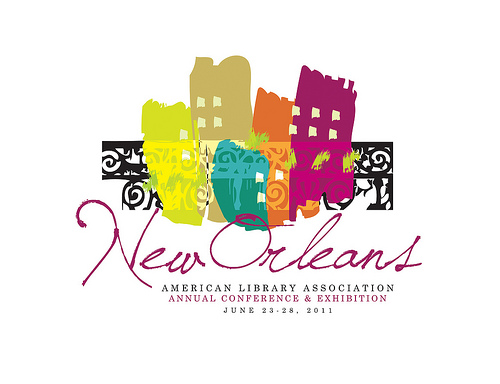
Thanks to @catladylib and @KrisKreidler and those who anonymously submitted questions about attending ALA Annual 2011 as library school students and new librarians.
Introducing Yourself
I have to admit this is the one thing I really hate about meeting new people, introducing myself. It often feels rude and presumptuous but most people expect to meet new people at conventions, they just want the you to introduce yourself so that they don’t have to feel awkward and introduce themselves to you. Here’s a few things you can do, please feel free to suggest more strategies if the comments:
Hi I’m [insert name] from [insert organization], and you are?
My name is [Insert Name] and I’m a [insert title/library school student/etc.], what do you do?
A good way to decide who to introduce yourself to is to pay attention to speakers and people who ask questions in Q & A portions. When someone says something interesting in a presentation that’s relevant to me I’ll often approach them afterwards either to ask a questions and/or exchange contact information.
HI, my name is [insert name] and I really enjoyed your talk/presentation, [insert question].
Networking 101
You may feel like you have to attend a presentation or workshop in every single time slot, here’s the problem with that. You can’t network, also known as getting to know people, when you’re in a room where 1-4 people are doing all of the talking. Attending and giving presentations is good but you should be spending just as much time getting to know people are you do attending sessions.
The biggest secret is not to be so worried about building your network, get to know people and the your network will grow. Don’t look at people as potential network contacts, look at them as interesting individuals and talk to people who you have something in common with. What you have in common could be your specialty, a hobby, a love of debating, even your shoes, if you don’t have anything in common you won’t maintain the contact.
- Schedule your sleep time, if you don’t you will fall asleep halfway through the receptions and networking events. You will also get sick, very sick. I’m not joking this happens every conference to a significant number of people, you’re traveling and lack of sleep just kills the immune system. (It’s okay to sleep in or take a nap in the middle of the day.)
- Keep in mind that Friday / Saturday / Sunday night it’s normal to stay out till between midnight and 2am, some people are still living it up even when you leave at 2am.
- Schedule your networking events. Write down every networking event you think sounds interesting even if they overlap, then ask your friends to trade schedules with you, write down any events that you had missed. This will maximize your opportunity to socialize and learn from other librarians.
- Don’t be a snob, go to events that interest you outside your specialty. It’s amazing how much you can randomly learn from librarians who work in completely different areas than you.
- You don’t have to drink alcohol to be social but it’s good to at least have a glass of water or soda if you’re at a reception or event, if you haven’t had something to drink in the last hour you probably need a little water anyway to be properly hydrated.
- If someone starts a conversation with you while waiting for an event to open or sharing a seat on the conference shuttles don’t be afraid to be friendly and respond (unless they are being a creepy stalked type person in which case feel free to avoid them at all costs.)
- People love to be asked for advice or their opinion take advantage of this to learn more about others and help them stand out in your memory.
- Don’t ask for a job unless you are interviewing, it’s a major turn off. Do ask for job hunting advice and let people know if you are looking and what types of jobs you are interested in.
You might also be interested in my ACRL 2011 conference handout:
Staying Genuine And Creating Connections: Networking And Involvement For Introverts (PDF)
Getting on Committees
It’s true, committees are always short handed. Most people want to attend events and consume materials not create them. If you show up at a committee meeting (almost all of them are open meetings) and participate in the discussion you will most likely be drafted if you don’t volunteer to help with something first. They are also good places to get to know other professionals and library administrators.
What to Wear
*Please keep in mind this advice only applies to attending conference activities, not going out for fun with your friends.
Think about what types of events you will be attending and keep in mind that you will be in New Orleans and it’s summer time. Cotton, silk, bamboo, and other natural fiber should be your first choice, they breath well and help keep you feeling cooler. Woven clothes can be cooler than knit because they don’t cling so much to your body. Whites and light colors are the most light reflective. Rethink the nylons unless you’re attending something formal, women from hotter climates like myself don’t wear them much for a reason.
Going to something sure to draw lots of administrators or a committee meeting?
Think about wearing business casual.
Hitting the exhibits, hanging out with friends, doing something touristy?
Nice casual is fine (i.e. jeans and a nice t-shirt).
Shirts with collars and longer sleeves are seen as being more professional. If you wear long sleeves go for cotton or linen (may need ironing).
Never Okay:
- If you would have been embarrassed to be seen in the outfit when you were in a highschool gym class just say no!
- If it looks like you slept in your clothing take the time to iron them or have the hotel clean your clothing to remove the wrinkles. An easy way to avoid horrendous wrinkles is to take your clothes in a carry on garment bag or to roll your clothes. (A few wrinkles are okay.)
- If you would be in danger of being arrested for indecent exposure leave the outfit at home.If your outfit is see through in strong sunlight it’s not conference appropriate.
Business Cards
You need to bring plenty of these, Stephen Abram once told me they should be passed out like after dinner mints. It’s old fashioned, but it works. Double points for having a QR code on the card people can scan to get to your website or work contact info. This lets people choose scan the code and have one less thing to carry around, and those of us who like a Rolodex to have a card to stick in our file.
For more tips you can read my previous post:
Make The Most Out Of Your Conference
From Others:
Conference Attendance Advice by Erin Dorney
27 Things To Do Before a Conference by Chris Brogan
Have more questions or advice for attending ALA Annual? ?Please leave a comment below.
Any comments with links will have to be approved due to the overwhelming amount of spam this site receives but no login is required and I will approve ASAP!

